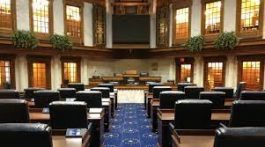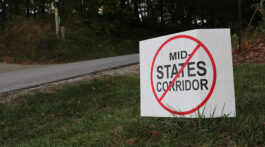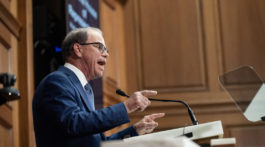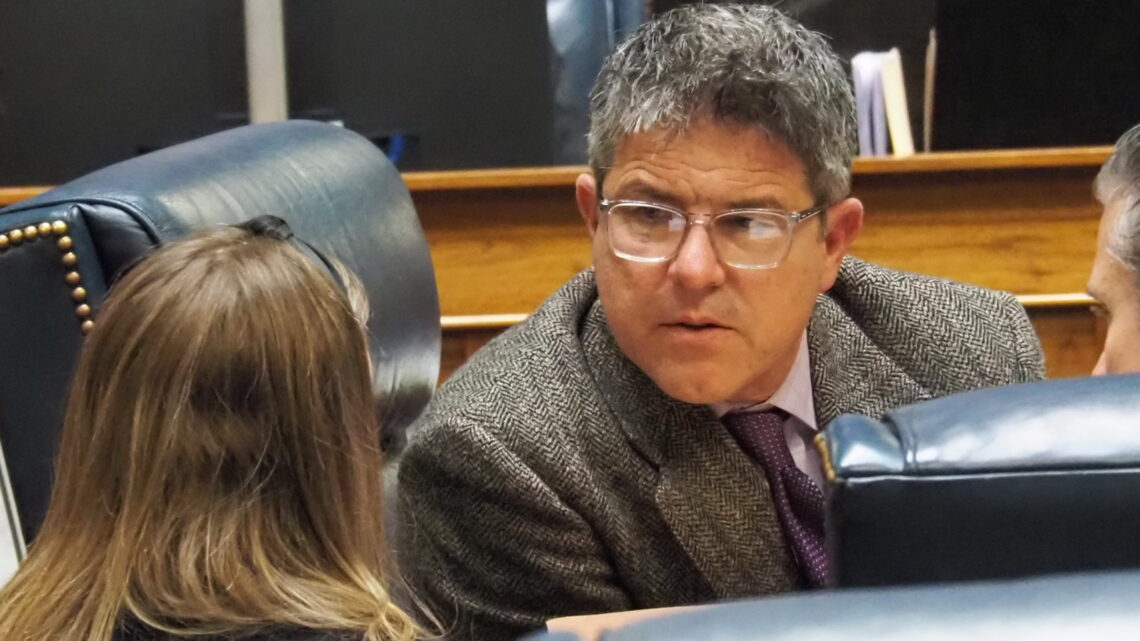by Casey Smith, Indiana Capital Chronicle
October 22, 2025
Republican leaders in the Indiana Senate say they don’t currently have the votes needed to pursue a mid-decade redraw of the state’s congressional map — a setback for Gov. Mike Braun and national Republicans who have been pushing for new lines ahead of the 2026 midterm election cycle.
“The votes aren’t there for redistricting,” said Molly Swigart, spokeswoman for the Indiana Senate Republican caucus, in a statement Wednesday.
The comment, first reported by Politico, underscores a weeks-long impasse that’s attracted national attention. President Donald Trump and other top GOP officials have eyed Indiana as a potential opportunity to pick up one or two additional Republican seats in the U.S. House. They hope to maintain control after the midterms.
The Indiana Capital Chronicle has tracked public statements from lawmakers on the proposal. So far, just four Senate Republicans have come out in favor of a mid-cycle redistricting plan, while three have said they oppose it. The remaining members of the 40-strong caucus are either undecided or have not made definitive statements.
Braun, who has publicly supported redrawing the congressional map, countered Wednesday by saying he is still in talks with lawmakers.
“I am still having positive conversations with members of the legislature,” Braun said in a post on X. “I am confident the majority of Indiana Statehouse Republicans will support efforts to ensure fair representation in congress for every Hoosier.”
The Republican governor spoke at a mental health summit Wednesday afternoon in Indianapolis but did not take questions from the media after his remarks.
The Statehouse’s GOP supermajorities drew the current congressional map in 2021, using 2020 census data. District boundaries aren’t due for updates until after the 2030 census.
Republicans hold seven of the seats. Democrats have two.
Republicans still split
Calls for redistricting have divided the state GOP caucus in recent months.
Sen. Liz Brown, the Senate’s assistant majority floor leader and Judiciary Committee chair, reiterated her support on social media Wednesday.
“I was the first Senator to publicly support redistricting back in August,” she wrote. “@GovBraun, call us into session! Let’s get this done! ✅”
She said, too, that Hoosiers should “call your Senator, State Rep, and educate others on the need to redistrict.”
Brown is also running a radio ad in support of redistricting in Fort Wayne.
Lt. Gov. Micah Beckwith, who also serves as president of the Senate, additionally issued a lengthy statement Wednesday sharply criticizing members of his own party for hesitating on the issue.
“The people of Indiana did not elect a Republican supermajority so our Senate could cower, compromise, or collapse at the very moment courage is required,” Beckwith wrote, calling on GOP senators to “find your backbone” and back a “9-0 conservative map.”
The development drew an immediate response from Indiana’s Democratic leaders, who reiterated their opposition to early redistricting.
House Minority Leader Phil GiaQuinta, a Democrat from Fort Wayne, said Wednesday that lawmakers should focus on other priorities.
“Nobody is asking for redistricting. Instead, Hoosiers are asking their elected leaders to fix their high utility bills, property taxes and absurd health care costs,” GiaQuinta said. “House Democrats have received massive amounts of calls against redistricting, and I’m sure the Senate Republicans have, too. I’ll continue to monitor the possibility of redistricting until we end the 2026 legislative session in March.”
Hoosiers do not want mid-decade redistricting. Thank you to the state senators who are listening and refusing to vote for it.
– Common Cause Indiana Executive Director Julia Vaughn
In the Indiana General Assembly, a constitutional majority is required to pass a bill. That means at least 26 votes in the Senate and at least 51 votes in the House. Republicans currently hold 40 seats in the Senate and 67 seats in the House.
Voting rights advocates praised holdout GOP senators.
“Hoosiers do not want mid-decade redistricting. Thank you to the state senators who are listening and refusing to vote for it,” Common Cause Indiana Executive Director Julia Vaughn said Wednesday. “Now, let’s wave the checkered flag and end this talk about mid decade redistricting. Time to make it clear — no special session, no mid-decade redistricting, and no more bullying by the federal government on a policy Hoosiers oppose.”
Pushback continues
The current map gives Republicans a 7-2 advantage in the state’s congressional delegation.
National Republican strategists have argued that shifting boundaries — particularly in the 7th District, held by Democratic U.S. Rep. André Carson, but also in northwest Indiana’s 1st District, represented by Democratic U.S. Rep. Frank Mrvan — could make those seats more competitive for the GOP heading into 2026.
Legislative caucus condemns early redistricting campaign for ‘diluting Black voting power’
Several conservative commentators and social media influencers reacted negatively to the latest news on Wednesday.
One national strategist, Rogan O’Handley, wrote, “We want NAMES Who are the RINO holdouts in Indiana who don’t want to redistrict to save this country They’re about to be real famous.”
He also speculated former Vice President and Indiana native Mike Pence is pulling strings against early redistricting.
“Is former Indiana Governor Mike Pence trying to get revenge on the MAGA movement that he backstabbed on J6 and telling Rodric Bray jot to redistrict? Hmmm. That’s what we’re hearing!”
The setback comes after weeks of speculation in the Statehouse, fueled by a series of meetings between Hoosier GOP leaders and top figures in Trump’s orbit, including Vice President JD Vance.
The president has been personally engaged in lobbying Indiana Senate Republicans, including joining a private call with members of the Senate GOP caucus as recently as Friday to push for the remap.
Discussions have centered on ways to strengthen the party’s position in the U.S. House — where Republicans hold a narrow majority — by encouraging states with GOP strongholds to redraw districts before 2026.
House Speaker Todd Huston and Senate President Pro Tempore Rodric Bray, both Republicans, have refused to publicly say where they stand.
Need to get in touch?
Have a news tip?
Indiana’s GOP legislative leaders have met at least three times with Vance in recent months. Bray described the latest conversation as “productive,” though he stopped short of confirming whether Senate Republicans were united behind an early redraw.
Braun has maintained that his goal is to “let the legislature lead.” He has repeatedly said that he’ll wait to call lawmakers back until they signal readiness, telling reporters in August, “You’re going to hear individual representatives and senators speak up … That process will take a while to play out.”
But Braun also warned that “if we try to drag our feet as a state on it, probably, we’ll have consequences of not working with the Trump administration as tightly as we should.”
If a special session is not called, the next regularly scheduled legislative session will kick off in January. Candidate filing for the 2026 primary opens Jan. 7.
Multiple polls — including one released in August and one earlier this month — have found that the majority of Hoosiers oppose early redistricting.
One statewide survey found that a majority of Hoosiers — about 53% — oppose early redistricting, compared to just 34% who support it. Another survey showed waning trust in both parties, with growing numbers of voters saying they feel disconnected from state political leadership.











